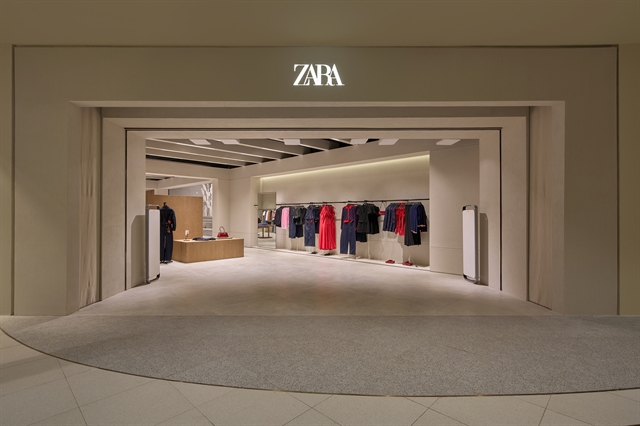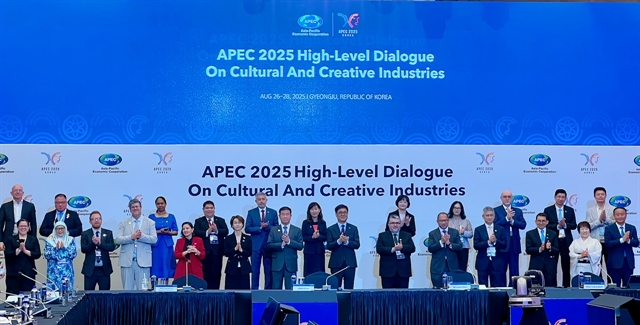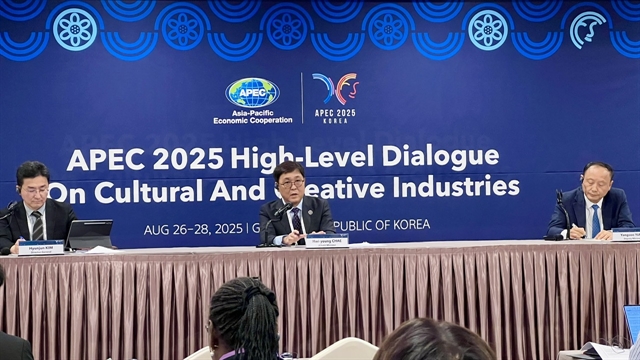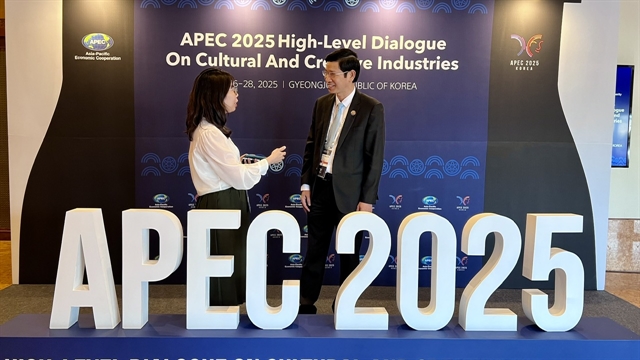 Life & Style
Life & Style

 |
| APEC delegates pose for a photo in the opening ceremony. — VNS Photo Mai Hương |
By Mai Hương
GYEONGJU — Culture is taking centre stage for Asia-Pacific Economic Cooperation (APEC), as ministers, policymakers and industry leaders gathered in Gyeongju, South Korea, on Wednesday for the forum's first-ever High-Level Dialogue on Cultural and Creative Industries.
The meeting marked a milestone for the 21-member economic cooperation forum, placing culture and creativity alongside trade and technology as drivers of growth, jobs and innovation.
South Korean Minister of Culture, Sports and Tourism Chae Hwi-young said the cultural and creative industries had “firmly established themselves as a core sector that directly influences macroeconomic indicators such as economic growth and job creation."
This growing awareness reflects a global trend, with governments increasingly investing in the sector as a pathway to sustainable development.
“Until now, we have focused on issues such as the digital economy, trade and energy, but now we are recognising the economic value of the culture industry. This is the first time it is being addressed as a new driver of regional growth, and we believe it will also serve as a platform for cultural cooperation among APEC member economies,” Chae told reporters.
During the meetings, delegates explored how the sector could serve as a new engine of growth under APEC’s 2025 theme 'Building a Sustainable Tomorrow'. Sessions looked at digital technologies, artificial intelligence and the role of cultural exchange in strengthening resilience and community ties.
Minister Chae said that based on the documents adopted at this meeting, APEC will establish a framework for follow-up discussions and cooperation with existing working groups, such as tourism, while also exploring joint projects.
“Our goal is to hold regular high-level dialogues, working closely with member economies and the APEC Secretariat, and to carry these outcomes forward into next year, in coordination with the next host, China,” he said.
 |
| South Korean Minister of Culture, Sports and Tourism Chae Hwi-young speaks at the press briefing. — VNS Photo Mai Hương |
UNESCO’s representative warned that global challenges, such as climate change, inequality, technological disruption and conflicts, are undermining progress on Sustainable Development Goals.
He stressed that recognising culture as part of sustainable development is a strategic investment, noting the sector already generates over 3.1 per cent of global GDP and provides more than 50 million jobs.
For Việt Nam, cultural cooperation was seen not only as an economic matter, but also as a foundation for trust and peace.
Deputy Minister of Culture, Sports and Tourism Hồ An Phong told Việt Nam News that culture is “a natural bridge between peoples, helping us share creativity while building understanding and trust."
“Diversity is a strength that unites, not divides,” Phong added.
He emphasised that cultural cooperation also supports the creative industries, which are a priority in Việt Nam’s strategy to 2030.
“Sharing policies, training and digital applications in culture creates not only new economic value, but also genuine trust through practical, win–win cooperation,” he said.
 |
| Deputy Minister of Culture, Sports and Tourism Hồ An Phong speaks with a Việt Nam News reporter on the sidelines of the meeting. — VNS Photo |
Above all, he added, culture connects people to people.
“This is the foundation for APEC to overcome challenges and work together for peace, stability and shared prosperity.”
Phong pointed to the growing ties between Việt Nam and South Korea as a vivid example of cultural diplomacy in action. He recalled that the recent State visit of Party General Secretary Tô Lâm to South Korea featured a strong cultural component, leaving a deep impression on both peoples.
The deputy minister noted that APEC can draw valuable lessons from this experience.
“We need long-term cultural cooperation frameworks with high-level agreements. We should organise rotating cultural festivals so people experience regional diversity first-hand. And we should link culture with education and creative industries to inspire younger generations and shape a shared APEC identity,” he said.
Other speakers echoed this message. Gyeongju Mayor Joo Nak-Young described culture and industry as “twin engines”, with culture connecting communities and industry turning those ties into innovation, opportunity and prosperity.
He said the dialogue was timely and in line with APEC’s 2040 vision of connection, innovation and prosperity.
“Creativity rooted in Asia-Pacific traditions, combined with cultural assets and industrial innovation, could guide the region towards a sustainable future,” he noted.
The mayor expressed his hope that the meeting in Gyeongju would be a stepping stone for long-term cooperation, evolving into a lasting platform for cultural and creative industries within APEC.
At the conclusion of the meeting, member economies issued a joint statement reaffirming their commitment to developing cultural and creative industries as a driver of regional growth, while promoting greater understanding and cooperation among members. — VNS




